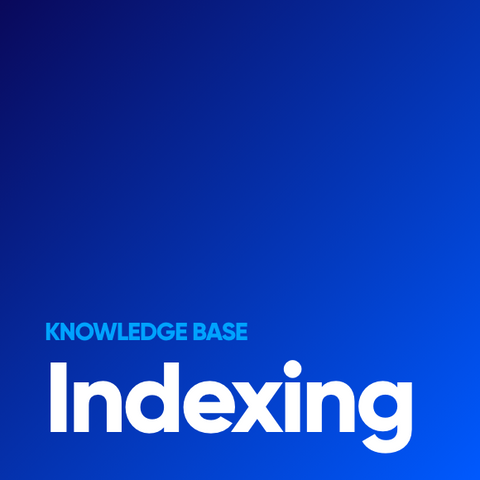Introduction to Indexing
Imagine the vast digital realm of the internet as an expansive library. It's a library that contains billions of books, each representing a webpage or digital content. Now, think about how you'd find a specific book in such a colossal library. This is where the concept of indexing comes into play.
Indexing in the context of the World Wide Web serves as the cataloging system of the digital world, enabling search engines to understand, organize, and retrieve web pages effectively. This chapter introduces you to the fundamental aspects of indexing, setting the stage for a deeper exploration of how search engines like Google assemble and manage the digital library of the internet.
What Is Indexing?
At its core, indexing in web search is adding web pages to a search engine's database or index. It's akin to adding books to the shelves of our vast digital library, making them accessible to anyone searching for them.
Why Is Indexing Important?
Imagine a library where books are stored randomly, without order, categorization, or catalog. Finding a particular book amidst the chaos would be next to impossible. In the digital context, if web pages aren't indexed, search engines face a similar problem when providing relevant search results. This organization and retrieval process makes search engines like Google mighty and valuable to users.
How Does Indexing Work?
Before we delve deeper into the intricacies of web page indexing, let's explore the fundamental workings of this process:
-
Crawling: Search engine crawlers or bots continuously browse the web, visiting web pages and following links from one page to another. This process is often referred to as web crawling or spidering.
-
Collecting Information: As these crawlers explore web pages, they collect data. This data includes text, HTML tags, links, and various other information about the page.
-
Storing Data: Once collected, this data is stored in the search engine's index. The index is a massive database containing information about web pages and their content.
-
Ranking: Search engines analyze the indexed data and use complex algorithms to determine the relevance of web pages to specific search queries. This ranking process helps ensure that search engine users receive the most relevant and high-quality results.
Now that we've established a fundamental understanding of web page indexing let's dive deeper into how search engines like Google perform this process and the factors that influence it.
How Search Engines Index the Web
Search engines are the gatekeepers to the internet, and how they index web pages profoundly influences what we find online. This chapter delves into how search engines like Google index the web, giving you insights into the process that powers your daily internet searches.
Crawling: The First Step of Indexing
Crawling is the first step in the web page indexing process. It's akin to search engine bots exploring the vast digital library of the internet. In this phase, bots, also known as web crawlers or spiders, systematically visit web pages, following links from one page to the next.
Crawling operates on a vast scale, and these bots are remarkably efficient. They use algorithms to determine which sites to visit, how often to see, and which pages within those sites to crawl. This process is crucial for keeping the index updated with fresh content and identifying changes to existing pages.
How Does a Web Page Get Indexed?
Have you ever wondered how a web page goes from a digital document to a searchable online entity? In this chapter, we demystify the journey of a web page, from creation to indexing. Understanding this process sheds light on how content becomes accessible through search engines.
1. Content Creation
The journey of a web page begins with the creation of content. Content can be in the form of text, images, videos, or other digital elements. As content creators, individuals or organizations generate web pages to share information, express ideas, sell products, or provide services.
2. Website Publication
Once the content is created, it's published on a website. A website is like a digital storefront where you display your content for the world to see. To make your web page discoverable, it needs to be accessible on the internet. For this, you'll need a web server and a domain name.
3. Web Page Crawling
The journey of a web page from creation to indexing gains momentum with web page crawling. Search engines, using specialized bots or spiders, systematically visit websites and traverse the web by following links. These bots crawl pages and index content, building a massive catalog of web pages.
4. Inclusion in the Search Engine's Index
Web page indexing is the heart of the process. It's when the content found during the crawling phase is analyzed, organized, and added to the search engine's index. The index serves as the vast database that search engines draw from to provide relevant results to users.
5. Availability in Search Results
Once a web page is indexed, it becomes accessible through search engine results pages (SERPs). When users enter search queries, search engines retrieve and display indexed pages that match the search terms. This is how your web page gets in front of users actively seeking the information or products you offer.
The Factors Influencing Indexing
Web page indexing is far from a uniform process. Search engines, notably Google, use complex algorithms to determine how and when to index a web page. This chapter explores the factors that influence indexing and affect a web page's visibility in search results.
Content Quality
Content is king on the internet, and its quality significantly impacts indexing. High-quality, original, and informative content will likely be indexed and ranked well. Conversely, low-quality or duplicate content may need help to gain visibility in search results.
Website Authority
Search engines consider the authority and credibility of a website. Established and reputable websites are more likely to be indexed quickly and rank well. Website authority is often measured through domain age, backlinks from other authoritative sites, and overall online reputation.
Page Speed
Page speed, or how quickly a web page loads, is crucial for user experience. Slow-loading pages may not be crawled and indexed as efficiently as faster ones. This factor underlines the importance of optimizing a website for speed.
Mobile Friendliness
With the growing number of mobile internet users, mobile-friendliness is essential. Search engines prioritize mobile-responsive web pages and may index them more effectively.
Indexing and SEO
SEO (Search Engine Optimization) is a field that enhances a web page's visibility in search engine results. Indexing plays a pivotal role in the world of SEO, as the index forms the foundation for search engine rankings. This chapter explores the profound connection between indexing and SEO, emphasizing the techniques and strategies used to influence the indexing process.
Indexability
Indexability measures a web page's potential for being indexed by search engines. It encompasses various aspects, including proper indexing directives, content quality, and SEO best practices. Making a web page more indexable involves optimizing factors like robots.txt files, meta tags, and canonical URLs.
On-Page SEO
On-page SEO techniques aim to optimize individual web pages to rank higher and earn more relevant traffic. This includes strategies like keyword optimization, meta tags, image optimization, and structured data markup. On-page SEO helps ensure that your content is indexed and correctly.
Sitemaps
Sitemaps are files that provide a roadmap of your website's content to search engines. By submitting sitemaps to search engines like Google, you can help ensure that your web pages are discovered and indexed promptly.
Structured Data Markup
Structured data markup involves adding additional information to your web pages in a structured format. This data helps search engines understand the content better and may result in the display of rich snippets in search results.
Search Console and Webmaster Tools
Search Console, previously known as Google Webmaster Tools, is valuable for website owners. It provides insights into how Googlebot views your website and can help you identify indexing issues. Regularly monitoring the Search Console can lead to improved indexing and SEO performance.
The Future of Indexing
In this fast-paced digital landscape, the future of web page indexing continues to evolve. This chapter explores emerging trends and predictions that could shape the indexing landscape in the years to come.
Artificial Intelligence and Machine Learning
The rise of artificial intelligence (AI) and machine learning is poised to revolutionize the indexing process. These technologies can improve search algorithms, enabling search engines to understand and index web pages more accurately.
Voice Search
With the growing popularity of voice-activated devices, voice search is altering how users query search engines. Future indexing will likely need to accommodate voice-based queries and provide more relevant results.
Video and Visual Search
Visual content is gaining prominence, and optical search technology is emerging. This technology allows users to search using images, which could change how content is indexed and retrieved.
Mobile-First Indexing
Mobile internet usage continues to surge. As a result, mobile-first indexing is becoming a standard practice. Search engines now prioritize indexing mobile versions of web pages over desktop versions.
User Experience and Core Web Vitals
User experience, including page speed and mobile-friendliness, will remain a significant factor in indexing. The Core Web Vitals initiative aims to measure and optimize user experience on the web.
In this comprehensive guide, we've embarked on a journey through web page indexing. From understanding the basics to exploring the intricate connections between indexing and SEO, you now understand how search engines like Google organize the digital universe.
Indexing is not just a passive process but a dynamic and essential aspect of interacting with the digital realm. As the future unfolds, indexing will continue to adapt to emerging technologies and user behaviors. And, in this ever-evolving landscape, your knowledge of indexing will serve as a valuable compass, helping you navigate the intricacies of the web and enhance your online presence. Whether you're a website owner, a digital marketer, or simply a curious explorer of the digital world, the journey of indexing holds boundless discoveries and endless opportunities.

Indexing





